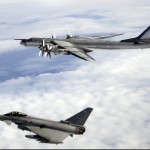Current thinking on threat response, defence credibility and effective deterrence rely too heavily on symmetric and equal response to provocation. This article will argue that strong states ought to consider that moderating their responses to overt acts – especially in the first moments – can have greater effect than is usually considered. For these actors, force need not meet force, especially in the first response, to be effective.
In the world since 9/11 the orthodox view in defence and security circles defines asymmetry of thought and deed is the province of the weak.[1] While it is certainly the case that the approach offers such actors a means to bridge the capabilities gap, to limit its application to this quarter is unnecessary, if not foolish. Instead, by taking advantage of asymmetry a state increases its “war chest” of options, which not only enhances individual security but international stability as well.
I would like to argue here that in many respects asymmetry is valuable to great and even middling powers by giving them a wider and more diverse range of options. Unlike for the weak, rather than a means to target critical vulnerabilities, this asymmetry enables the strong to avoid wasting effort or raising tensions unnecessarily. It is based on the state’s willingness to exercise restraint, perhaps even to step back, especially in the early stages of event. This essay will sketch the contours and virtues of this model of asymmetry to frame the thinking.
Obviously such a position is contrary to much which is held as self-evident within the realm of international security. The reader may be tempted to quit here in disbelief that one should argue that the lesser response can be the more effective option in matters of security. Antithetical though it may seem, this necessity is in fact accepted at the most basic infantry tactical level, where a retreat in the face of confrontation serves to enable an effective response.[2] To step back and gather one’s wits and forces before acting is accepted as a wise move, contrary though the concept of retreat is to success in general military practice. Thus, while the concept may be counter-intuitive on its face, it does in fact stand upon established practice and sound principle.
Neither should it be suggested that taking such a stance must diminish actual security preparations. Alongside the lesser responses at first and at the lower end of the threat spectrum it would make sense to include known “lines” or end points which mark a steep response curve. Thus, while fighter aircraft might no longer be scrambled to confront foreign aircraft approaching a border, any incursions beyond 2 minutes’ flight time or within a danger-minimum range of a city would be dealt with harshly – or some other response along those lines.[3]
Of course, there is also the problem that a dominant theme in security strategy is that states must project adequate credibility and resolve. However, whether the zero-sum-game mentality that informed such rigid approaches in the last 75 years were effective then, today they seem at best to inspire spasmodic reactions to destabilizing effect. This leads to an international scene which is like a ship buffeted by the tumult caused by challenging actions and escalating responses. In contrast, a more measured approach to the response side of the equation which does not act in a particular way simply because one must, is actually quite in the mold of the original “containment” approach argued for by George Kennan in his Long Telegram.[4] In his world view, credibility and resolve arose from a strong society, strong economy, wise governance and international sobriety.
Applied to matters of national security and defence policy, what are ways in which we can imagine a figurative step backwards, a notional retreat which creates the space for effective action? The first and most important point of asymmetry when responding to international challenges would be the recognition that force need not counter aggression and violence to be effective. This is a simple concept and yet it is largely ignored.[5]
To give a sense of asymmetry in situations of over aggression, there is no better example than the Berlin Airlift. This act of strategic humanitarian assistance did not confront Soviet actions in and around Berlin directly, did not seek to forcibly alter the military calculus on the ground. Rather, the Western powers relied upon other capabilities to side-step Soviet military deployments and render their blockade of the German capitol irrelevant. It is important to note that the US, Great Britain and France lacked the sufficient strength on the ground to “fight” in defence of the city but had an overwhelming advantage in resources, particularly materiel and lift. Fortuitously so, for in that moment of crisis and tension, one which could have turned over to a major war, the recourse to a non-aggressive but highly effective response likely saved history from a bloody and gruelling sequel too close on the heels of WWII’s madness. Thus, although driven by circumstances to choose the path of lesser force, even if inadvertent the lesson from Berlin stands.
Asymmetry is also to be found in more deft uses of diplomacy. States, both individually and in international institutions, have a host of diplomatic options available to them but too often these are overlooked in a rush to display “strength.” Looking specifically at the crisis in the Ukraine, rather than attempting to counter Putin directly or force a change in his behaviour, the levers of political action and speech, especially within international institutions, could have been used to great effect. When things began to unravel in Eastern Ukraine, a proactive move in the UN in defence of the rights of the ethnic minorities in the region was an option short of direct confrontation that offered political and symbolic leverage. To support Putin’s public policy while thwarting his effort to shape events on the ground would have fundamentally altered the dynamic of this still unfolding crisis early on at a lower risk profile for further escalating matters.[6] [6]
Bringing the concepts together at the various levels relevant to defence and security, I would offer that such a framework offered many alternative responses to 9/11. The attack perpetrated by Al Qaida was tragic, but not, in fact, serious in terms of US national security. Al Qaida needed dealing with, but a more restrained approach to the Taliban and Afghanistan would have served American security needs more effectively. To wit, the US would have been better off “allying” with the Taliban to remove Al Qaida from the country. And then, the US should have left Afghanistan thus making this little more than a focused military response to the specific problem of Al Qaida’s safe training grounds. Then, in the words of another whom I find compelling, the US should have paused to consider deeply and well whether additional use of military force served any good purpose. There was so much international good will in the aftermath that could have been used to terrific advantage, not only for the US but the international community as well. More importantly, as we grapple now with a seeming viral trend in radicalisation, fed by the endless fuel of hopelessness, to reflect upon the lost opportunity to fundamentally alter the calculus of despair is strategically frustrating.
It is time that states, especially strong ones, recognize that their defence might best be served by more wisdom and less muscle. In an increasingly chaotic world, brains, not brawn, ought to be seriously considered as the appropriate framework for national security policy and planning.
Autor: Jill Sargent Russell, King’s College
[1] I think the best piece on the application of asymmetry by the weak is Melissa Applegate’s monograph, “Preparing for Asymmetry: As Seen Through the Lens of Joint Vision 2020, (Strategic Studies Institute, September 2001 http://1.usa.gov/1gVk78E). It might seem to read as if it were a response to the events of 9/11, but that only speaks to the quality of the assessment of how a weak opponent would apply the terms of asymmetry.
[2] Timothy Lupfer’s monograph, “The Dynamics of Doctrine: The Changes in German Tactical Doctrine During the First World War” (Combat Studies Institute, 1981) http://1.usa.gov/TlHvr5 The obstacle to the effective tactical reorientation of their defence and counter-attack for a “line” (you know, like a border) was the refusal to accept that it required a physical step backwards. This act, to retreat, even if for tactical advantage, was anathema to German military culture at the time. And yet, as Lupfer demonstrates, this was the critical and effective step to tactical prowess in the war. Had they accepted that truth sooner it is arguable that events might have unfolded differently.
[3] The origins of this piece arose from a comment I made regarding the Dutch scrambling jets in response to Russian bombers in their neighbourhood. I wondered if it would not be more effective to do nothing so as to demonstrate that this was not really a threat.
[4] “Long Telegram,” George Kennan, February 22, 1946. http://www2.gwu.edu/~nsarchiv/coldwar/documents/episode-1/kennan.htm. Patrick Porter offers a more recent review of the issue of resolve and credibility, “Carlito’s Way: Resolve and the Narcissism of Great Powers,” War on the Rocks, April 2014, http://warontherocks.com/2014/04/resolve-and-the-narcissism-of-great-powers/.
[5] Perhaps this view is gaining traction, as in the recent interview with CJCS General Dempsey at Defense One, “Dempsey Wants to ‘Rebalance the Use of Military Power.’ http://www.defenseone.com/ideas/2014/05/dempsey-wants-rebalance-away-use-military-force/84271/?oref=defenseone_today_nl
[6] I wrote on this for Kings of War, “Chess on the Crimean Riviera: What if Europe and the United States had been smart in the Ukraine?” (19 March 2014), http://kingsofwar.org.uk/2014/03/chess-on-the-crimean-riviera-what-if-europe-and-the-united-states-had-been-smart-in-the-ukraine/.




Stay In Touch